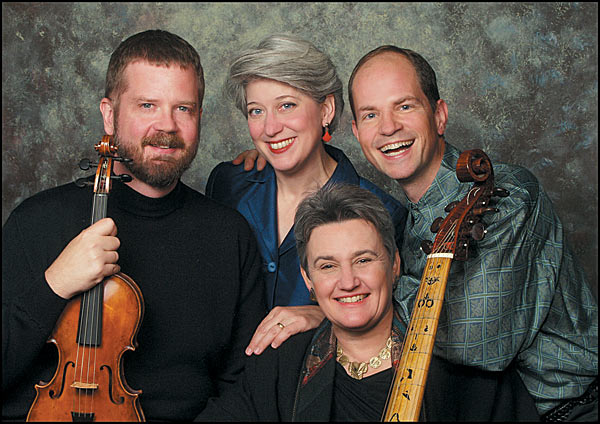How do I love thee? Newberry counts the ways in “Dangerous” program
Although the music of the 17th Century can be quite varied, the poetry that it’s set to is not. A few songs is all it takes to pretty much exhaust the era’s stock imagery and endless lamenting of Cupid’s stinging darts.
But Friday night at Newberry Library’s Ruggles Hall, smart programming saved “Dangerous Love — Playing with Fire” from any looming monotony of lyric, and helped to make this recital of period works by Chicago’s Newberry Consort a varied and enjoyable closer (after two more performances) to their season.
Better-known composers like Monteverdi and Frescobaldi rubbed shoulders in the all-1600s program with the likes of Tarquinio Merula and Domenico Mazzocchi—names probably familiar only to the era’s most devoted listeners. The Newberry Consort’s music directors, soprano Ellen Hargis and violinist David Douglass, divided the concert into six themed sets of three to five pieces each. Themes with titles such as “Into the Deep End” and “Jealousy” progressed through the various stages of love.
Each set also included instrumental pieces, led by Douglass, that weren’t necessarily “about” love but in context were open to romantic interpretation. Under most circumstances, Merula’s Capriccio Cromatico is a cerebral counterpoint exercise. Its placement here, in a set entitled “Stolen Kisses, Burning Glances,” made its chromaticism seem expressive of longing — an effect heightened by harpsichordist Charles Metz’s rubato-filled performance.
For the vocal music, Hargis was joined by soprano Margaret Carpenter Haigh and bass-baritone Daniel Fridley, both participants in the Consort’s Young Artist Mentorship Program. All three singers hyper-characterized their songs: facial expressions, vocal inflections, ornaments — all were larger than life. In other repertoire, this might have come across as overplaying. But such overt gestures are accurate to this music’s era and necessary in making it speak clearly to an audience unaccustomed to the style.
Each of the three singers took some fine solos. Haigh has a bright, clear instrument, and a talent for character portrayal, which she put to good use in conveying the haughty disdain of Mazzochi’s Sdegno, campion audace. Fridley displayed the nimbleness of his voice in navigating his upper and lower ranges throughout all of his songs, and took a broadly comic turn, complete with commedia dell’arte mask, in S’io son pazzo.
Hargis’s tone was fuzzier and less focused than that of her younger colleagues. But she effectively portrayed the varied and sometimes conflicting emotions of all of the characters she portrayed. In Luigi Rossi’s Anime, voi che sete dalle furie d’Abisso, her many dramatic shifts in color depicted well the state of being caught between hating and relishing love.
Many of the most enjoyable pieces were not the solos, but the duets and trios, in which the singers got to play off each other with great chemistry. Particularly excellent was Martino Pesenti’s Ardo, ma non ardisco in which Hargis and Haigh perfectly overlapped in their cries about alternately being consumed by desire.
The instrumental pieces were more of a mixed bag, with occasional wayward intonation from Douglass. The instrumentalists’ rough-and-ready sound lent itself best to more rustic, rather than elegant, fare, delivering one of their best performances with Mario Uccelini’s pomp-filled “La Gran Battaglia,” Sinfonia 34, Opus 4.
The other highlight was a set of variations on the Baroque era’s favorite chord progression: La Folia. Rather than duplicate arrangements popularized by the likes of Corelli and Vivaldi, the instrumentalists passed the tune amongst themselves and improvised, as if taking jazz solos. Those of bass violinist Jeremy David Ward and guitarist Brandon J. Acker, in particular, danced off their strings with rhythmic verve.
This program will be repeated 8 p.m. Saturday at the University of Chicago’s Logan Center and 3 p.m. Sunday at Northwestern’s Galvin Recital Hall. newberryconsort.org; 773-669-7335.
Posted in Uncategorized





